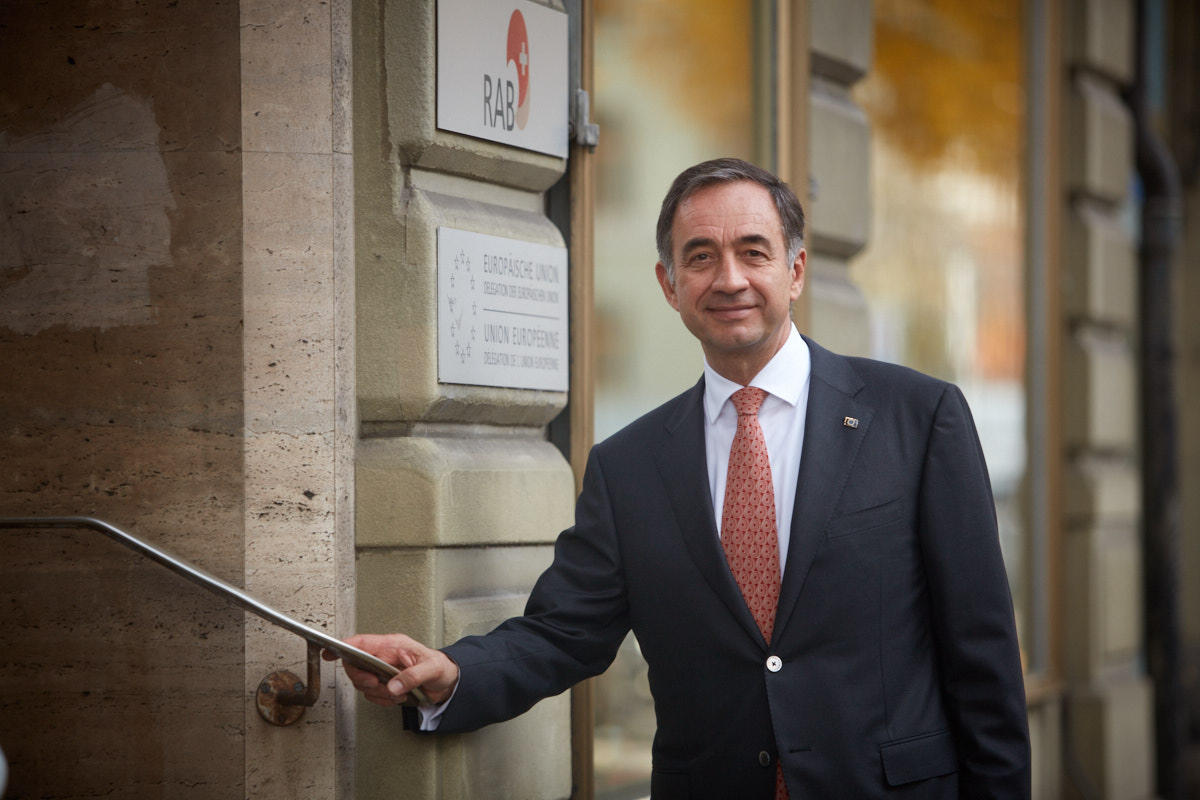Brussels’ man in Bern hints at Swiss protectionism

The European Union’s ambassador to Switzerland, Michael Matthiessen, highlights the benefits for Switzerland of close relations with the EU, but he diplomatically warns against measures that discriminate against EU companies.
swissinfo.ch spoke to Matthiessen on the eve of the annual Congress of the Swiss Abroad. This year’s theme is “Switzerland without Europe – Europe without Switzerland”.
Since 2014, Bern and Brussels have been negotiating an institutional framework agreement with each other. Its purpose is to reorganise the selected bilateral agreements – in particular those agreements concerning single market access. But the procedure has raised various questions, for example regarding correct interpretation and application, adaptation to changing EU law and dispute resolution.
+ Read more about Switzerland’s relations with the EU
+ Framing the terms for future Swiss-EU relations
swissinfo.ch: Why do we need this famous institutional framework agreement?
Michael Matthiessen: Without being a member of the EU or the EEAExternal link [European Economic Area], Switzerland has, thanks to bilateral agreements, access to the EU’s single market, the largest market in the world. This allows Swiss companies to be integrated into the production chains of European industry and, for example, to do more business with [the German state of] Baden-Württemberg than with China and more with northern Italy than with Japan!
But a single market is much more than a free-trade area. It entails a coherent and dynamic legal basis. This is not foreseen in the existing EU-Switzerland agreements, as these were originally conceived as a transitional solution with a view to possible accession. Since Switzerland will not join the EU or the EEA but at the same time would like to extend access to the internal market, for example in the electricity sector, now is the time to consolidate our agreements via an institutional framework. This is so that the economic operators on both sides can act in a system of equal opportunities and legal certainty. And also so that we can subsequently develop our relationships in new areas.
swissinfo.ch: Can the EU understand that the free movement of people can be questioned in Switzerland, given the high rate of immigrants and European cross-border workers in the country?
M.M.: The mobility of people is one of the foundations of the bilateral agreements between Switzerland and the EU. It should not be forgotten that, in general, free movement works very well and that both the EU and Switzerland benefit a great deal. There wouldn’t be 1.4 million European citizens here if the Swiss economy did not need this workforce. There would not be 300,000 cross-border workers if there were no need for them.
I would also like to point out that free movement allows mobility in both directions. The Swiss can also work in neighbouring countries, they can study or do research through European programmes such as Horizon 2020, and they can cross borders without hindrance since Switzerland is a member of the Schengen AgreementExternal link. Proportionately, there are more Swiss in the EU than EU citizens in Switzerland: 470,000 Swiss live in the EU out of a population of 8.3 million, compared with 1.4 million Europeans in Switzerland out of a population of 512 million.

More
Switzerland’s special EU deal
swissinfo.ch: The EU complains about accompanying measures, such as the eight-day rule, which requires European businesses to announce a week in advance their missions to Switzerland and to pay a deposit. Does Switzerland not have the legitimacy to defend itself against wage dumping?
M.M.: The EU doesn’t want to prevent Switzerland from defending itself against pressure on wages. The EU shares the principle of equal pay for the same work in the same place and has itself adopted rules to avoid wage and social dumping. The problem is that some Swiss measures discriminate against companies coming from the EU and in fact look like protectionism.
swissinfo.ch: Those on the political right are fiercely opposed to this framework agreement. For them, it increases the risk of losing sovereignty and the death of direct democracy.
M.M.: I don’t think the framework agreement will make Switzerland less independent. I note that Foreign Affairs Minister Ignazio Cassis and state secretary Roberto Balzaretti are making great efforts to explain the importance of relations between Switzerland and the EU and the need to give a stable basis to the agreements that give Switzerland access to the EU internal market.
But it’s not up to us, the EU, to judge whether such an agreement is in the interest of Switzerland or to negotiate with Swiss political parties or the Swiss people.
Adapted from French by Thomas Stephens

In compliance with the JTI standards
More: SWI swissinfo.ch certified by the Journalism Trust Initiative

You can find an overview of ongoing debates with our journalists here. Please join us!
If you want to start a conversation about a topic raised in this article or want to report factual errors, email us at english@swissinfo.ch.